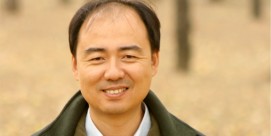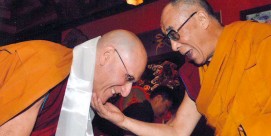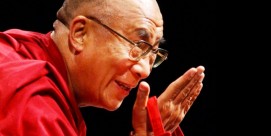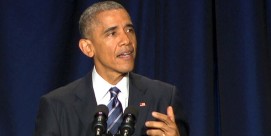In This Episode << SLIDE LEFT TO SEE ADDITIONAL SEGMENTS
Tu Weiming Extended Interview
Read more of the Religion & Ethics NewsWeekly interview with Tu Weiming, professor of Chinese history and philosophy and Confucian studies at Harvard University:
Q: What is the core message of your recent speech about the Dalai Lama and Tibet?
A: I think it’s important to make a distinction between the Dalai Lama and the Tibetan independence movement and also to understand the Dalai Lama from a more religious perspective than simply a political perspective. It’s important for China to become religiously musical and also concerned about identity politics. So in the long term perspective there is a great deal of space for communication and negotiation and of course on the side of the Dalai Lama the possibility of allowing both the Dharmsala radicals to express themselves but also to distance himself from some of the so-called rioters.
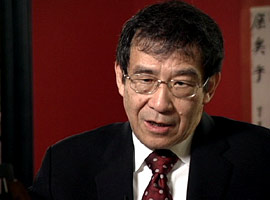 Q: What has been the impact of the recent Tibetan protests inside Tibet and inside China?
Q: What has been the impact of the recent Tibetan protests inside Tibet and inside China?
A: I think in a way [it has been] unprecedented, but in the long run I hope some reconciliation can be worked out. From the Tibetan side, of course, 50 years of Dalai Lama’s exile provided an opportunity for the Tibetans to rethink about their situation and because of the young Tibetans, the so-called Youth Council, their position in a way is not identical to the Dalai Lama’s position. I think the Dalai Lama makes this very explicit on a number of occasions, that he is searching for autonomy and hopefully with an emphasis on culture, whereas the young Tibetans are more interested in independence, separating from China. China because of her involvement with the Olympics wanted to present a peaceful, harmonious image, and the Tibetan situation has fundamentally challenged that. That’s not only the position of the government, but I think the intellectual community and the general people as a whole, and that’s the reason why the situation becomes very explosive.
Q: Does the Chinese government really believe, as they say, that the Dalai Lama is behind the protests?
A: The Chinese government is not at all informed about the Dalai Lama as a spiritual leader. They always perceive him as a political leader interested in mobilizing anti-Chinese forces outside of China, not only the United States but in Europe and even in Japan and other places. My sense it’s a misperception that needs to be corrected.
Q: The current president of China, Hu Jintao, oversaw Tibet and a harsh crackdown on it in 1989. Shouldn’t he know about Tibetan culture and religion?
A: China, before the open reform policy, had gone through radical transformations every 5 years, so the sense of restlessness, the sense of the importance of stability is very pronounced. Any challenge to that particular sense of stability would be considered as a major threat. On the other hand, precisely because Chinese leaders have been overwhelmed by modernization, development, I would say a form of scientism, the leadership has very little understanding of religion, especially of religion in the 21st century, and they are also not very sensitive to what may be called identity politics. So it’s not just Tibet, but also the whole question of the non-Chinese speaking Muslim community, the so-called Eastern Turkestan issues. So they look at it in a broader perspective. They are deeply worried about the question of sovereignty being compromised because of this particular challenge.
Q: Robert Thurman says that prior to China’s 1959 invasion the Tibetans had turned their swords into plowshares and were a peaceful people. The Chinese say they see Tibet as part of their country. What is the reality as you see it?
A: I think from the Chinese point of view ever since the Opium War in the mid-nineteenth century, every ten-year period there is major change. Chinese sovereignty was totally overwhelmed by Western powers. So this sense of trying to make China an integrated nation was very strong not just in People’s Republic of China, but I would call Chinese diaspora or cultural China broadly defined. There’s no question about the fact that after Tibetans had become very much in the tradition Tibetan Buddhistan, they became peaceful and the situation happened recently and the Chinese so much concern about the harmonious society of the whole nation believes that any sort of challenges especially linked to the outside world would be too threatening for their stability. I think that’s a misconception. The Chinese even mentioned, some scholars mentioned about the danger of “Khomeni Phenomenon,” for example, if the Dalai Lama returns to Tibet, Lhasa in particular … the situation may be uncontrollable. But on the other hand I think it is highly desirable for the Dalai Lama to return to China, maybe to go to a sacred mountain, a kind of Buddhist pilgrimage, and on his return give a [press] conference in Beijing to make his own position very explicit. Then of course the Chinese government can also organize a press conference to state their own position. So with that kind of communication, I think the possibility of some settlement very good. So far there have been about six or seven direct communications, but on the Chinese side it is run by the so-called United Front. People are very acutely aware of political issues, and these people are not particularly sensitive to religion, and no religious leaders are being involved in this kind of negotiation. There’s also a misconception of Dharmsala and their concern for independence as being very firm, and that’s the conflict.
Q: Historically was Tibet already part of China or did it become part of China in the 1950s?
A: Sovereignty was an issue that didn’t emerge in China before it became important in the nineteenth century, so China was a great civilization that became a nation, or struggling to be a nation, since the nineteenth century. So the question of whether Tibet is an integral part of China from the point of sovereignty didn’t even occur before the nineteenth century, but Tibet has been very closely linked to China and has been in communication with the Chinese leaders probably for centuries. And China claimed that Tibet is an integral part of China, not in terms of sovereignty but in terms of cultural interaction and in terms of the power of China in the political sense that in a way embraced the Tibetan region. But from the Tibetan point of view the cultural differences have been very great. At the same time there are religious differences, not to mention ethnic differences, so the sense that Tibet is independent from a cultural point of view has a great deal of merit as well.
Q: You have mentioned the importance of stability to China and the fact that there is little understanding of religion among Chinese leaders. Is religion seen as an attack on stability?
A: They are actually learning. Right now there is a very strong sense religions — such as Christianity, Buddhism, Islam, and of course Taoism and so forth — can be important stabilizing force of this society, allow the people to search for certain kind of spiritual sanctuary so they would be able to collaborate with this enterprise, I would say “joint venture,” to make China peaceful, the so-called peaceful development actually is accepted by everyone.
Q: Tibetans say the Chinese improvements and modernization of Tibet dilute their culture and religion. Is there some truth to that?
A: I certainly think from the perspective of the Dalai Lama and many Tibetan intellectuals and Tibetan people in general that is the case. On the other hand, I think the truth of the matter is China believes that in the last few decades the government has contributed significantly to Tibetan growth in terms of economic growth, in terms of building roads and so forth. But from the Tibetan point of view, if cultural identity is not respected, if Tibetan culture, especially religious practice, is not fully understood then even this modernization in material terms may not be particularly welcomed. I think recently one of the major problems is the government’s intention to educate the Tibetans. They tried to promote patriotism or patriotic education among all these temples, so the monks became very resentful of this kind of imposition of ideology and, you may say, even cultural chauvinism. So I think it’s important for the government to be very sensitive to the Tibetan sense of self-understanding and self-identification. It is extremely difficult for Chinese from Beijing and other places to settle down in Tibet, and very few of them managed to do that. Hu Jintao, for example, was in control of the area, but he stayed most of the time in Sichuan and other places rather than Tibetan plateau, because it’s very difficult for anyone to settle down there for an extended period of time.
Q: Because of the altitude?
A: Because of the altitude, yes. So many Chinese that went to Tibet, either traders or merchants, they had a very specific interest in Tibet either from the commercial or political point of view, I think most of them — their appreciation of Tibetan culture is I would say outmoded because this very strong scientific ideology, the assumption that human history progressed from religion to metaphysics to science and rationality, a very limited sense of rationality — I call it instrumental rationalilty. As a result the Tibetans feel that they are humiliated, they are ignored, they are marginalized, because people don’t understand why they are so devoted to religion, to the Dalai Lama. Their devotion sometimes is wrongly perceived as a kind of superstition that should be overcome by modernization, by progress, right now by the market economy. But I think it’s important also to note that Tibet, like all parts of China, and to a certain extent East Asia as a whole, this has been very much “marketized,” so the younger people do not have a very strong sense of their cultural heritage or their religious identity. That’s true with all parts of China. Materialism, progressivism, scientism, instrumentalism all become powerful forces in threatening [what has been] a great cultural tradition, religious tradition, for centuries.
Q: The Dalai Lama has accused China of waging religious and cultural genocide in Tibet, destroyed monasteries, imprisoning monks, forcing monks to denounce him. Has this been happening in China’s patriotic education programs?
A: It’s been happening, but I think the idea of forced migration and arresting monks and so forth sometimes may be exaggerated. On the other hand, because of this tension and conflict between the Chinese perception, Beijing’s perception of what Tibet ought to be and many Tibetans, spiritual leaders and people in general, what they would like to be, that conflict is very strong, and when the conflict leads to confrontation often the reaction of Beijing is very strong and that provoked a counter reaction from the monks. I think that’s, to me, very unfortunate. It’s been going on for some time, and I think a long-term resolution would have to be made, and some kind of mutual understanding is necessary. Direct political negotiation is important, but cultural interchange and understanding in the long run would be more important.
Q: As the Chinese leadership becomes younger will they be more open and not so afraid of Tibetan culture and religion?
A: Yes, my sense is that if China begins to understand her own religious traditions — Buddhism, Taoism, even the spiritual side of Confucianism, for example — if they take India absolutely seriously as a reference culture, then China would mature in the sense to understand the positive aspects of religion, and now I think they must have learned the lesson: inability to understand religion can turn out to be very costly in terms of their diplomacy, public image, or political activity, both inside and abroad. So I think in the long run the possibility of mutual understanding is really there, but in the short run the situation is not only very dangerous, the situation to me is very depressing, precisely because misconception, misunderstanding will persist. I think China should take the lead to try to change and improve the Chinese mentality in understanding not just Tibet but all the minority groups and of course the whole question about how religion in general can be a harmonizing and stabilizing force.
Q: What will happen when the Dalai Lama is no longer on the scene? Could there be much more violence, since up to now he has been keeping a lid on the younger Tibetans?
A: I totally agree. I was deeply worried when I was in China that not just the government officials [but] some intellectuals believe that if Dalai Lama fades from the scene the problem will be resolved. My sense is the Dalai Lama has played a very important role in the peaceful transformation of Tibet, outside of China, and also the possibility of mutual understanding, and he is a key factor for the resolution, that China should seize that opportunity. I met him a few times and I think he even made rather explicit the idea that he wanted to withdraw from politics and to become a spiritual leader exclusively. From the Chinese point of view it is very important to take advantage of the effectiveness of the Dalai Lama, not only in the spiritual realm, but also in the political realm, to come to terms with the rapid and even explosive change of the Tibetan communities not only in China, but outside of China. So I agree with you. If the misunderstanding persists, if Dalai Lama fades from the scene, the situation will be uncontrollable. It will be more than 10 or 100 Falun Gong situation. Of course, we also cherish the hope that the situation will not occur, but the danger is always there. I think the Chinese government should be critically aware of this.
Q: Do you have any idea where the Panchen Lama [the second highest ranking Lama after the Dalai Lama] is?
A: I have no idea, but I am really disappointed that misunderstanding occurred, because originally the Dalai Lama and the Chinese government identified the same person. Unfortunately, the Chinese perception, once that news was announced first before China announced it, [led to] total misunderstanding of the situation. Now we have presumably two Panchen Lamas, and I think most of the people outside of China would consider the real Panchen Lama is now in prison, one of the youngest political prisoners. I think that issue needs to be openly discussed. Of course, there is also the radical situation, the Dalai Lama actually mentioned it, that whole system of the Dalai Lama maybe in danger, because that system from the deep political sense is a collaboration between Tibet on the one hand and Beijing on the other. If that relationship is severed, then certainly there will be no real relationship politically between Beijing and Lhasa.
Q: The Tibetan protests seemed to demonstrate that the average Chinese looks at the Dalai Lama as a rather evil, sinister character.
A: This is in the broader context, because the Olympics has been built as one of the most important events in modern Chinese history to present the best possible image of China, and either through propaganda or actually voluntary participation this has been embraced by not only the Chinese in the People’s Republic of China but in cultural China and other areas. Certain form of patriotism, some people say maybe nationalism, are very strong, very strongly felt, especially when the press outside of China, Europe, and the US began to underscore negative features of China, and they become very worried about this real confrontation between two very different perceptions about what China is. Similarly, Dalai Lama in Chinese press and Dalai Lama in any other presses, including Japanese, are two radically different Dalai Lamas. One is totally a political figure with a great deal of ambition and capable of mobilizing all kinds of anti-Chinese forces. You can say it is anti-Sinitic. On the other hand, the Dalai Lama — even with many Chinese people they deeply understand his spirituality. He’s one of the most influential spiritual leaders in the world and certainly is a focus of Buddhist devotion. So these two images on the surface cannot be reconciled, but they function at different levels. If China begin to understand the Dalai Lama at a spiritual level and the Dalai Lama and his group become more sensitive to the Chinese worries at the political and economic levels, and some kind of understanding can be reached, my sense is the Dalai Lama’s understanding of the Chinese situation is much superior to the Chinese understanding of Tibetan culture and the role of Dalai Lama in the spiritual world, not just in Buddhism but in many other areas as well. The Dalai Lama is like the pope in the Buddhist tradition.
The perception from the Chinese side [is] the Dalai Lama is involved in the conspiracy against China. From the Dalai Lama’s side, China is developing a strategy to destroy Tibetan culture. My sense is it is not necessarily the case. Dalai Lama, so far as I can tell, really wants to have reconciliation. He hopes that he will be able to return to China, and as a spiritual leader that is his home. From the Chinese point of view, China certainly wants this tension and conflict to be reduced, and there is some desire, and maybe a strong desire with the more sensitive intellectuals, to become religiously more knowledgeable and more sensitive. So I think the conspiracy theory needs to be reexamined. The other one is extremely complicated, is the tension in Dharmsala between Dalai Lama’s perception of what ought to be done, and some of the young Tibetans who advocate independence, very hostile to the Chinese situation. I think they don’t mind some kind of riots happen in China. From the Chinese point of view, there are many, many Tibetans, they are already leaders probably in Tibet and other places, and they are in control, and they worry about any change because that would affect their personal interest and their power base. So the situation is complicated, not just Chinese and Tibetans, but Chinese and Chinese and Tibetans and Tibetans. That’s the reason why the more reasonable groups in China and reasonable groups in Tibet need to begin a serious not just dialogue, but a dialogue that leads to concrete action. Of course, the international community, those who are very much interested in human rights, in the cultivation of a cultural peace, and the importance of resolution of any conflict in the world, should take part in this joint venture. Of course, this is my wishful thinking, maybe highly idealized, but I think we need to enter this question not with an either-or approach, but both-and, to look at it as a complex issue to be resolved and to find a way of doing it. Any improvement is desirable. Any conflict will lead to further conflict and may lead to an irreversible process of violence. Both possibilities are there, and given the current situation, it’s so explosive I’m worried that the kind of option everybody, rational people, don’t want to see happen may even happen.
Q: You mentioned the Chinese government is religiously unmusical. Why is that? Is it because of communism?
A: I don’t think so. The issue is much more complicated and historically more significant. Ever since the May Fourth Movement in 1919, 30 years before the establishment of the People’s Republic of China, the ethos of the Chinese intellectuals, overwhelmed by aggressions from the outside, is to say wealth and power — these are the things if China wants to be integrated, wants to be respected, China will have to develop its economic base, its political system, even its military might. And that is so pervasive, that’s the basis of what we perceive as either patriotism or nationalism. Virtually all Chinese, when I talk to the dissidents, before they became dissidents, all of them were committed to this notion of national integration or sovereignty. Sometimes that [was] even considered superior to democratization, to the possibility of amicable relations between China and the rest of the world. So one thing, I feel very troubled if the people in China, under the leadership or the promotion of the government’s position, believe that sovereignty is at stake, they can sacrifice the Olympics. So that is the bottom line. If sovereignty is not at stake, and it’s a question of some kind of aggressive attitude towards China, because of China’s so-called peaceful rise, or peaceful development, those issues can be resolved.
Q: How has religion come into conflict with Chinese notions of sovereignty? Why has there been such a negative reaction toward religious groups?
A: Throughout Chinese history, often the government takes a kind of benign neglect, but once a religion became politicized, became a force for challenging the authority of the government, it happened also in China quite often — the so-called White Lotus group, the Taiping Rebellion, some rebellions motivated by Buddhism and so forth — the Chinese government became very determined to suppress these religious movements, so the nervousness about religion, especially foreign religions, especially religion that’s not part of the indigenous tradition, and especially the modernistic mentality — you know, many of the leaders in China are engineers and scientists, and some of the scientists really strongly believe, I think, an outmoded notion: that religion is superstition. Religion is sometimes identified with superstition, but I’m aware of the fact that many younger scholars with good training in religion now become advisors, so my recommendation is that even though United Front represents the political side of Beijing, the United Front will have to be advised, will have to be informed by these complicated not just religious but culture issues.
Q: Has there also been a rise in religious life in China, perhaps a search for spirituality after everything has been so material?
A: I think it is probably broader than that. Certainly recently the market economy may be very important for the accumulation of wealth and even reduction of poverty and so forth. There are many, many positive sides. But when the society becomes “marketized,” the market society or the marketization penetrates into all forms of human relatedness and the society is so transformed that younger people, I mean the younger people not only in the major cities of China but in Tibet as well, have become insensitive to the cultural resources, because their cultural tradition with very short memory is totally disconnected with the traditional culture, and that situation provide the ethos that is worrisome for all spiritual leaders. On the other hand, precisely because historically, meaning everything since the Opium War, especially May 4, 1919, the Chinese intellectuals were so much obsessed with modernization, modernism, scientism. That is the reason it’s difficult for the Tibetans.
Q: Currently in China is there more religious freedom? Less? The numbers of not only Buddhists but Christians and Muslims are supposedly on the rise.
A: Precisely. The religious activity have become more pervasive, sometimes more compelling, and the nervousness about religion also becomes greatly enhanced. So you can say there are more attempts to control, but at the same time no government, including Beijing, is able to control the situation. Because one religious sect has made the whole country nervous, the whole leadership nervous, so to try to learn about religion is also greatly pronounced as an urgent matter. In fact, the leadership in Beijing has made it very explicit: “We really have to understand religion.” But, of course, hopefully the religion that emerges in China will be part of the peaceful transformation, rather than major challenges. My sense is that religion is absolutely crucial for the 21st century, but at the same time religion can be both extremely positive and extremely negative, and I think the Chinese government is aware of it and yet how to really learn about it — not just the government but the intellectual community as a whole — is important. Twenty years ago, I talked about China’s need to take India as a reference, because if China does that then the forms of spirituality exhibited in India — they are so varied, so complicated — will be a major reference for China. This is beginning to happen, but slowly. Once China takes India seriously — it’s basically the software, the economic competitiveness, not enough about Indian spirituality.
Q: Does Confucianism play into the Chinese psyche?
A: Absolutely. I think the area we call Chinese culture area, maybe Confucian culture area, includes mainland China, Hong Kong, Tawain, Macau, Singapore, Vietnam, South Korea, and Japan — very large area, and in this area for years and years peaceful coexistence of religions turn out to be defining characteristic of the spiritual landscape of this area. China, we talk about three religions: Buddhism, Taoism, Confucianism. More recently, ever since the Ming Dynasty, 14-15th centuries, five religions: Islam and Christianity. Japan — three religions: Buddhism, Shintoism, and the Japanese understanding of Confucianism. And in Korea right now Christianity is very, very vibrant. But Confucianism persists in terms of the habits of the heart, so in Confucian world religious cooperation, religious coexistence is taken for granted, but Confucianism itself was totally marginalized, even deconstructed for the last three generations. So the ethos that emerges in China is totally obsessed with wealth and power, with scientism, with modernism, so they look up to Japan and the Western powers, especially recently the US, but not the more subtle religious traditions. You know, the US is one of the most religious countries in the modernized societies, much more than all the European countries, and China’s understanding of the US is basically market economy, military might, and political organization. I think that’s unfortunate. It’s very deeply rooted in the Chinese psyche, especially in the modern decades.
Q: Back to Tibet — what does its historical relationship with China have to say about the present situation?
A: Chinese history, of course, is long and complicated. If you look at the Manchu Empire from roughly 1644 to 1912, Tibet is an integral part of China, because the Manchu dynasty is linguistically plural, ethnically and religiously pluralistic. Four languages were used as official languages in the Manchu Empire: Manchu, Chinese, Mongolian, and Tibetan. So there’s no question about the fact that Tibet — of course the Dalai Lama system also emerged in that period. Now earlier, ever since the Tang dynasty, you can also see close relationship. You can say that Tibet has been for a long time very much part of the Chinese political sphere. This does not mean that Tibetan culture, Tibetan religion, Tibetan self-understanding has become an integral part of the Chinese psyche. In fact, for years and years Tibet as a culture believes that India is the father of spirituality, the source of inspiration, and China is a political protector. Recently, India still is a cultural resource, but China becomes an aggressive force against Tibet. So I think historically we make a distinction between a cultural history and the political history. Then we can see the interaction of these two civilizations in a complex way. There’s no reason why Tibet cannot be an integral part of China, as the Dalai Lama suggests, in an autonomous way. But since Dalai Lama’s understanding of Tibet is significantly different from the Chinese government’s understanding of Tibet, the conflict cannot be easily resolved. For the Dalai Lama, Tibet is a cultural idea, so it’s not in the Tibetan region. … From the Chinese perspective, Dalai Lama is claiming more than 20 percent of the Chinese territory as under his influence. This is unacceptable. But from the Dalai Lama’s point of view, what he wants to have is a peaceful existence, is to allow the Tibetans all over China to become equitable, to become possible preserving their own culture and developing their own styles of modernization. In fact, I believe this is not only doable, this is something that ought to happen — of course, again, from my wishful thinking. But there is a good possibility.
Q: What is it that the Chinese fear?
A: They are much more worried about the non-Chinese speaking Muslim communities, the so-called Uighurs. The Uighurs are so much a part of Central Asia now, with their own culture and ethnic identity. [It is] the so-called Eastern Turkestan issue. So China is worried about it, and understandably. Even Taiwan issue — the tension [is] greatly lowered. Again, it is something that can be very explosive.

